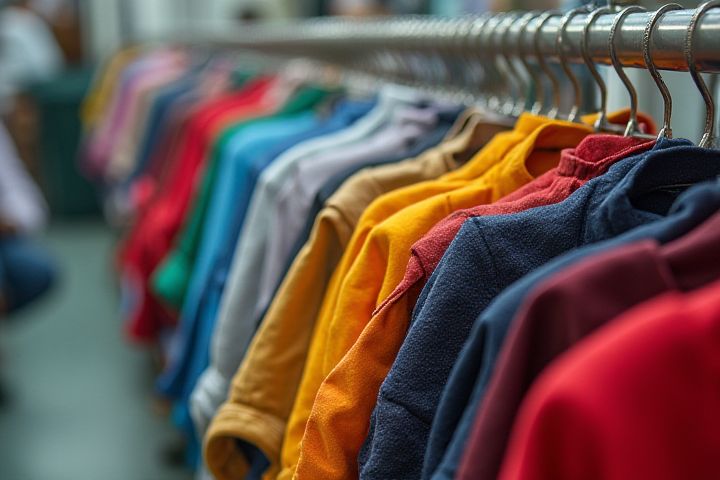
The textile industry in Nigeria is a significant sector contributing to the nation's economy, employing millions and providing essential raw materials for various fashion and garment businesses. Historically, Nigeria was renowned for its vibrant textile production, particularly in regions like Kano and Lagos, which boasted numerous local manufacturers and artisans skilled in traditional weaving techniques. The industry faces challenges such as import competition, inadequate infrastructure, and inconsistent power supply, which hinder growth and sustainability. Efforts are being made to revitalize this sector through initiatives that promote local production, increase investment, and support artisan communities in preserving indigenous textile crafts. Investing in the Nigerian textile industry presents opportunities for creating jobs, boosting exports, and enriching your cultural heritage.
Cotton Production
The textile industry in Nigeria significantly relies on cotton production, making it a pillar of the country's agricultural economy. With a favorable climate, Nigeria cultivates various cotton species, contributing to both domestic textile manufacturing and export opportunities. Efforts to enhance cotton production through improved farming techniques and the use of genetically modified seeds have emerged, aiming to increase yield and quality. As a key player in the African textile market, the growth of Nigeria's cotton sector is vital for job creation and economic development.
Local Demand
The textile industry in Nigeria is increasingly prioritizing local demand, promoting the production of fabrics that resonate with cultural heritage and consumer preferences. By enhancing domestic manufacturing capabilities, local textile firms are creating jobs and fostering economic growth within communities. Sustainable practices and the use of indigenous raw materials are becoming more prominent, reducing dependency on imported textiles. You can expect a rise in the availability of uniquely Nigerian designs that cater to both traditional and modern fashion tastes.
Government Policies
The textile industry in Nigeria is significantly influenced by government policies aimed at revitalizing this critical sector. Initiatives such as the Nigerian Cotton Industry Development Strategy promote sustainable cotton cultivation, enhancing raw material availability for textile manufacturers. Policies supporting local production are designed to reduce reliance on imports and stimulate job creation within the industry, facilitating economic growth. As a stakeholder or consumer, understanding these governmental efforts can help you appreciate the broader implications of textile manufacturing on Nigeria's economy and its potential for future development.
Import Challenges
The textile industry in Nigeria faces significant import challenges, primarily due to high tariffs and import duties that increase the cost of raw materials and finished goods. Local manufacturers struggle to compete with cheaper imported textiles, leading to a reduction in domestic production capacity and job losses. Fluctuating exchange rates further exacerbate the issue, making imports more expensive and unpredictable for industry stakeholders. Improving infrastructure and reducing import barriers could revitalize Nigeria's textile sector, encouraging local production and fostering economic growth.
Key Manufacturers
The textile industry in Nigeria prominently features key manufacturers such as Textiles Manufacturers Nigeria Limited (TMNL) and Nigerian Cotton Board, driving production and innovation. These manufacturers contribute to the economy by providing employment opportunities and promoting local cotton cultivation. The adoption of modern weaving and dyeing techniques enhances the quality and competitiveness of Nigerian textiles in both local and international markets. You can explore the evolving landscape of this sector, characterized by investment in sustainable practices and the push for the revival of traditional craftsmanship.
Trade Agreements
The textile industry in Nigeria is significantly influenced by various trade agreements, which aim to promote local production and support economic growth. Key initiatives, such as the African Continental Free Trade Area (AfCFTA), provide Nigerian textile businesses with increased access to continental markets, boosting export potential. Furthermore, bilateral agreements with countries like China and Turkey facilitate technology transfer and improve manufacturing processes in local textile production. You can benefit from understanding these trade dynamics, as they shape market opportunities and competitiveness in Nigeria's evolving textile landscape.
Textile Clusters
Textile clusters in Nigeria serve as vital hubs for production, innovation, and collaboration within the textile industry. These clusters facilitate the integration of local artisans, manufacturers, and designers, fostering a diverse range of textile products that reflect Nigeria's rich cultural heritage. By emphasizing sustainable practices and leveraging technology, these clusters aim to enhance the quality and competitiveness of Nigerian textiles on both regional and international markets. Engaging with these clusters can provide you with unique opportunities to explore diverse textile designs and contribute to the revitalization of the local economy.
Labor Market
The textile industry in Nigeria plays a crucial role in shaping the labor market, employing thousands of workers across various sectors, including manufacturing, distribution, and retail. With a rich history of traditional and contemporary fabric production, the industry fosters skill development and vocational training, which enhance the employability of individuals. Despite facing challenges such as competition from imported textiles and inadequate infrastructure, local manufacturers are increasingly adopting innovative practices to boost productivity. By investing in sustainable practices and technology, you can contribute to revitalizing this vital sector, ultimately leading to job creation and economic growth in Nigeria.
Infrastructure Issues
The textile industry in Nigeria faces significant infrastructure challenges that hinder its growth and competitiveness. Poor road networks, inadequate transportation facilities, and unreliable electricity supply affect the efficiency of cotton production and textile manufacturing. Access to quality water sources is also limited, which impacts dyeing processes and overall product quality. By investing in improved infrastructure, such as modern transportation systems and stable energy sources, Nigeria can enhance its textile industry's productivity and support local economic development.
Export Potential
The textile industry in Nigeria presents significant export potential, driven by an abundance of natural fibers such as cotton and jute. With a strategic focus on sustainable production practices, local manufacturers are increasingly adopting eco-friendly technologies to enhance their competitive edge in international markets. Nigeria's rich cultural heritage also inspires unique designs that appeal to global consumers, further bolstering export opportunities. By investing in infrastructure and skill development, you can contribute to positioning Nigeria as a leading player in the global textile sector.
